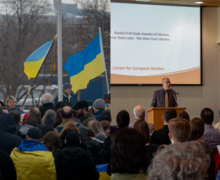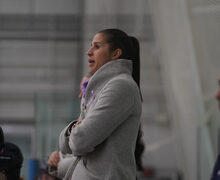Indigenous students, faculty share perspectives in campus experience panel discussion
Maxine Brackbill | Photo Editor
Panelists discussed their experiences as Indigenous people on SU's campus and what they think non-Indigenous people can do to show support. Many emphasized the importance of educating both students and faculty about modern Indigenous life.
Get the latest Syracuse news delivered right to your inbox.
Subscribe to our newsletter here.
When Rhiannon Abrams arrived at Syracuse University as a freshman, she felt lost and isolated as one of only a handful of other students from the Haudenosaunee Confederacy in her year.
This changed her sophomore year when she joined the Native Student Program at SU.
“I didn’t really have a sense of belonging until my sophomore year, and it was nice when I finally got involved in the Native Student Program,” Abrams, who is now the academic consultant for the NSP, said.
Abrams was one of four panelists in a discussion with Indigenous students in Bird Library Tuesday that centered around belonging on campus for Indigenous community members. The conversation covered topics of identity, community, navigating campus resources and how to educate non-Indigenous peoples on helping to foster support.
Abrams was joined by student panelists Adrianna Jones and Ava Mitchell, as well as Michelle Schenandoah, an SU alumna and adjunct professor of law, Bailey Tlachac, the NSP’s coordinator, and Michelle Mitchell, a reference and instruction librarian. The panel was one of many in SU’s series of events this November for Native Heritage Month.
The panelists discussed the different ways SU has gone about implementing and continuing strategies to create a closer community for Indigenous students in reference to SU’s DEIA Strategic Plan.
Jones, a freshman, discussed how she and another panelist, Mitchell, chose to live in the Indigenous Living Learning Community before coming to campus. LLCs are sectioned-off places within residence halls for students with common academic or interest affiliations.
“We’re surrounded by all Indigenous students as well, and it makes it so much easier to connect with them and we have our whole floor (of students) that are Indigenous,” Jones said. “We’re so close to each other because we share those common values and know what it was like to grow up in similar ways.”
Jones, Mitchell and Abrams then connected their conversation to the newly updated 113 Euclid, which serves as a safe space on campus for Indigenous students. Abrams said it took lots of advocating preceding the #NotAgainSU movement to get renovations started.
“We’ve had the space maybe since 2005, but still (limited) to those three offices and we had to make do with what we had,” Abrams said. “It was nice to actually gain space and have the new incoming students being able to utilize the space in a different way and feel valued and that they have a different type of support space, another community, a home away from home.”
The panel also discussed different microaggressions and oppressive experiences they have had on campus and how they stem from a lack of education. Jones said she has dealt with situations from both professors and students.
“With students, I’ve had people come up to me and ask me if Indigenous people still lived in tipis, if we know what grocery stores are. I’ve even had someone tell me they didn’t know Native people were still around,” Jones said. “Professors I’ve dealt with previously (have) invalidated my experiences as he was teaching to my classmates that my people get everything for free, free money, free housing.”
It was nice to actually gain space and have the new incoming students like being able to utilize the space in a different way and feel valued and that they have a different type of support space. Another community, and home away from home.Rhiannon Abrams
Schenandoah, an alumna of the S.I. Newhouse School of Public Communications who’s lived in the greater central New York region for most of her life, reflected on how harmful stereotypes are also present in life off campus.
“What happens in the US culture (is that it) doesn’t realize that they impose their sense of belonging as well as their perspectives and perceptions of us as Native people in terms of who belongs and who doesn’t based on looks, based on whether or not you carry an enrollment card, and so it can cut very deep very quickly,” Schenandoah said.
Schenandoah said she believes these issues are a conflict from a lacking Indigenous curriculum. Schenandoah said that while SU is implementing more cultural sensitivity training and education, in comparison to other universities, the erasure of Indigenous histories is not a simple issue to fix.
“But I think adding erased histories is core to incorporating current and contemporary issues that our people are facing, (which) become critical in all areas of education. It doesn’t matter what school you’re in, or what field it is. There is something that is related to indigenous peoples, and it’s not separate,” Schenandoah said.
The panelists all agreed that education was the best way for non-Indigenous SU community members to cultivate a better understanding and sense of community. Abrams said also promoting education for faculty members would help the Indigenous student community feel more valued, she said, as sometimes professors aren’t aware they have indigenous students in their class.
“I would like to see specific education for faculty and staff. It’s a very big thing to carry to educate your peers, and sometimes it’s hard because you have to educate your teachers,” Abrams said.
Jones shared this sentiment, stressing the importance for non-Indigenous people to be involved with practices that aren’t performative and learn about Indigenous people in modern society.
“It could become exhausting to always have to explain to people your experience and all that and it becomes repetitive too,” Jones said. “If more people were educated and just knew when we say, ‘I’m Indigenous,’ … we don’t have to feel that burden to go over it and explain.”
Published on November 14, 2023 at 11:16 pm





